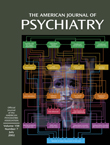Antipsychotic Drug Treatment in the Prodromal Phase of Schizophrenia
Abstract
OBJECTIVE: The safety and tolerability of short-term treatment with a low dose of risperidone was evaluated in adolescents with prodromal symptoms and a family history of schizophrenia. METHOD: Four prodromal high-risk adolescents and six first-episode patients with schizophrenia were treated with average doses of 1.0 and 1.8 mg/day of risperidone, respectively, in an 8- to 12-week open-label trial. RESULTS: No significant treatment-related adverse events were noted. Severity of thought and behavior disturbance ratings declined by about 30%; performance on a test of verbal learning improved by about 100% during treatment in both prodromal and first-episode patients, changes that achieved statistical significance despite the small group sizes. CONCLUSIONS: These findings are preliminary and should not be used to guide health care decisions at this time. Randomized controlled trials are needed to determine whether antipsychotic drug treatment of prodromal patients can delay or prevent onset or attenuate the clinical course of schizophrenia.



